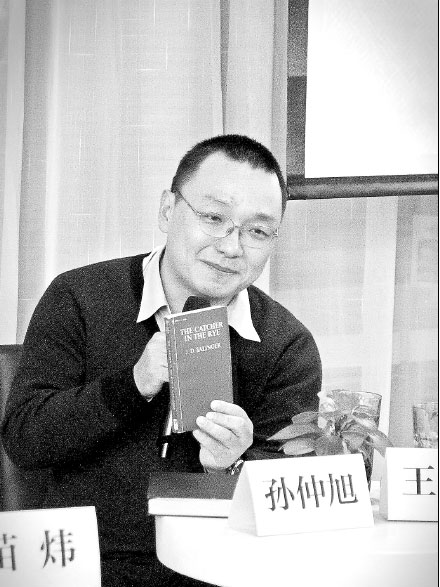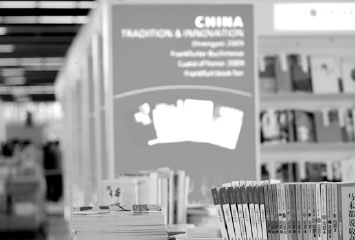War of Words
Updated: 2014-09-17 08:43
By Xing Yi(China Daily USA)
|
||||||||
Literary translation in China has lagged behind other professions in terms of income. Xing Yi speaks to experts to find the reasons why.
The recent death of respected translator Sun Zhongxun has prompted online discussion about pay for literary translation in China. Some Chinese social media users have asked if Sun was paid enough by publishing houses to sustain a decent life.
The topic has been in circulation for a while.
On Sept 4, Liao Zenghu, director of the editorial department of the literary periodical Harvest, cited a two-year-old report by the China Youth Daily on Sina Weibo, and accused Yiwen Publishing House of exploiting translator Wang Zhiliang in the early 1990s by paying him only 600 yuan ($97) for his translation of Russian poet Ivan Turgenev's voluminous poetic works.
Yiwen Publishing House issued a statement on Sept 9, showing archived receipts of payments of more than 2,300 yuan to Wang. Yiwen said that it had strictly followed the guidelines for translation payments set by the government.
Liao didn't respond to that statement, but he told reporters that his intention was to call attention to the plight of translators.
Although China's GDP has increased more than tenfold in the past two decades, the rates for literary translation have hardly caught up with the rise in income of other professions.
Liu Wenfei, a member of the Translators Association of China, says that during the 1950s, when the average salary of ordinary people in China was just a few dozen yuan, the translation rate was comparatively higher than it is today.
Ye Shuifu, a senior translator in China, for instance, earned 9,000 yuan in the 1950s for translating Russian writer Fadeyev's novel The Young Guard, Liu says.
"Ye later bought a courtyard near Wangfujing street in central Beijing. It should be worth tens of millions now," Liu says.
"It usually takes one year to translate a novel or two, and the translator can only earn roughly between 10,000 to 20,000 yuan from each book. But the monthly salary for a university professor is already about the same."
Liu is also a professor of Russian literature at the Chinese Academy of Social Sciences, the country's top think tank.
According to Liu, many senior literary translators do it part-time, out of love for translation and not purely for the money they earn. Such translators are usually employed full-time as professors of foreign languages or have retired.
"One can barely make a living in Beijing just by doing literary translation work alone."
In 2013, China's National Copyright Administration solicited comments for a set of guidelines on the payment for written works, in which the range of recommended rates for translation rose from the previous 20-80 yuan per 1,000 words to 80-300 yuan. However, the guidelines have yet to become effective.
"I'm afraid it won't help even if they take effect since the going rate is already around 80 yuan," says Chen Ying, a young freelancer, who translates Japanese books into Chinese. "It should be raised to at least 150 yuan."
Chen was lucky. The second book she translated in 2013 was the popular Japanese comic series Midnight Canteen, which earned her a good reputation.
Now the quoted rate for Chen is around 100 yuan per 1,000 words, which is considered high for young literary translators. Still, the income fails to cover all her expenses. Her family in Wenzhou, Zhejiang province, helps pay her rent in Beijing.
"Once, an editor joked that he could find a translator for the rate of 80 yuan per 10,000 words," says Chen. "I was so angry. A publisher shouldn't try to settle for the lowest translator's rate."
But some say that the traditional publishing industry is itself being hammered by competition in sales from online bookstores and digital publishers, and since most translators are paid for just their work instead of copyright royalties, cutting down on translation fees has become an easy way for publishers to curb their expenditure.
"We have to admit that the current translation rate is not high enough," says Shi Lingkong, the editor-in-chief of Yiwen Publishing House. "But we have to note that many publishers are also experiencing a difficult time."
Besides raising the going rate for translators, Shi suggests that taxes on remunerations from translation be changed so as to help alleviate any financial burden on professionals.
"The current threshold of the tax levy for written works is 800 yuan. It hasn't been changed for decades. But the threshold for salary income tax has already been raised to 3,500 yuan."
The commercial success of translated literary works also depends on many factors, such as the popularity of the original author, and the efforts on design and marketing, says one publisher, who wishes to remain anonymous.
"A good translator is an important factor but is not the decisive one."
Contact the writer at xingyi@chinadaily.com.cn
|
Sun Zhongxun, who committed suicide on Aug 28 at the age of 41, at a commemorating meeting in 2013 for the Chinese translation of The Catcher in the Rye, a 1951 novel by J. D. Salinger. Sun's translation of the novel was published in 2007. He suffered from depression prior to his death. Photos By China Photo Press |
|
Although China's GDP has increased more than tenfold in the past two decades, the rates for literary translation have hardly caught up with the rise in income of other professions. |
(China Daily USA 09/17/2014 page9)
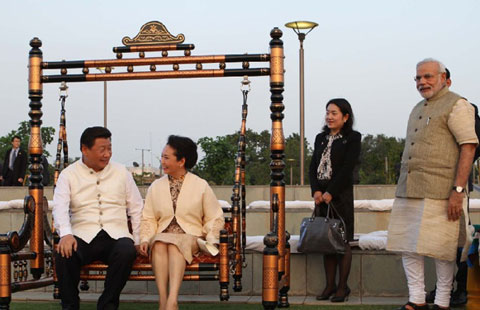
 President Xi and wife play swing in Modi's home state
President Xi and wife play swing in Modi's home state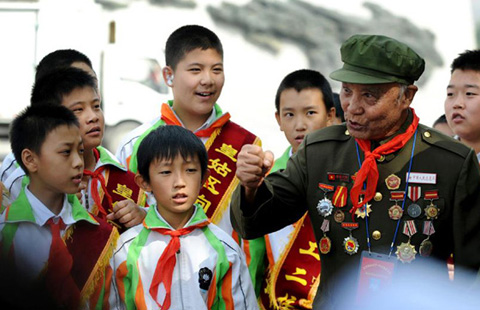
 9.18 Incident marked in China
9.18 Incident marked in China
 10 cultural facts about Scotland
10 cultural facts about Scotland
 PLA's 'Gold Helmet' air battle contest takes off
PLA's 'Gold Helmet' air battle contest takes off
 China's first Hermes Maison opening in Shanghai
China's first Hermes Maison opening in Shanghai
 Get together in space: experts
Get together in space: experts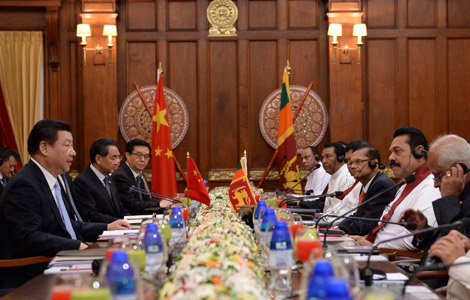
 FTA high on agenda of China, Sri Lanka
FTA high on agenda of China, Sri Lanka
 ZTE's ZMAX makes debut
ZTE's ZMAX makes debut
Most Viewed
Editor's Picks

|

|

|

|

|

|
Today's Top News
Xi, Modi set friendly tone for visit
China refutes US hacking charges
Chinese naval chief debuts at Seapower forum
Security risks found in half of China's govt websites
Chinese like trade, FDI, not acquisitions: Survey
Multilingual services bills on Brown's desk
Baidu speeds up online commerce
Ma named 'Asia Game Changer of the Year'
US Weekly

|

|
